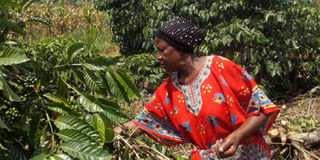How Covid-19 has reduced most farmers’ earnings

A coffee farmer in Masaka attends to her crop. Photo/ Michael J Ssali
Farmers in most parts of Uganda enjoyed a bumper harvest because of plentiful rainfall from August last year up to almost June this year.
Despite the good harvests the farmers complain of biting poverty as they find themselves having to sell off their produce at low prices and making losses. In his State of the Nation address last month, President Museveni remarked that agriculture belongs to the real economy category.
Since the inception of our country, agriculture has indeed been the major factor in Uganda’s economy and the source of our food since the majority of households are farmers. However the Covid-19 pandemic has been such a rude interruption that it appears difficult for nearly every sector to perform the way it used to before.
As the president pointed out agriculture is not only feeding us, it also earned Uganda a total of $2b (49 per cent of merchant exports).
During the Covid-19 total lockdown coffee alone brought in $45.87m in March and $36.928m in April. Maize, fish, and tea continued earning dollars for us when other usual sources of dollars such as tourism and Diaspora remittances disappeared.
Prices tumble
However, as the effects of Covid-19 continue to bite, agriculture is slowly becoming less and less profitable. There has been a sharp decline in the cost of most agricultural products including coffee ever since the Covid-19 pandemic lock down was imposed.
The closure of restaurants and hotels in an effort to minimize the spread of the corona virus meant less demand for items such as milk, eggs, beef, chicken, banana, beans, tomatoes, onions, vegetables and fruits.
The lockdown also meant loss of income for most people living in urban areas which greatly reduced their capacity to buy food.
This meant reduced income for farmers whose farm yields were rising because of favourable rainfall.
Due to travel and transport restrictions imposed during the Covid-19 lockdown it has not been easy for farmers to market their farm products.
Most of the farmers in Masaka and Mbarara districts that sold a bunch of bananas at between Shs8,000 and Shs12,000 before the Covid-19 lockdown are now selling at between Shs3,000 and Shs7,000.
The lockdown has been eased in some towns but business has not yet really normalised for most people living in Kampala and other cities.
Coffee
Despite a bumper coffee harvest in the last few months, farmers are complaining about low prices for the crop. In most of the Robusta coffee growing regions the price for a kilogramme of FAQ Robusta coffee (kase) has stagnated at around Shs3,800. Mr Sowedi Sserwadda, chairman of Kibinge Coffee Farmers Cooperative Society in Masaka told Seeds of Gold, “Whereas the quality of the Robusta coffee produced in this region has been very good because of the good rains we have not been able to enjoy good prices for the crop this season. And we blame it all on the Covid-19 outbreak. Our cooperative society exports coffee to Europe but due to the disease most restaurants in Europe are closed yet these are the places where coffee was consumed.”
“In Europe people drink coffee in coffee bars which are now closed due to Covid-19. So there is much less consumption of coffee. It is only bought for drinking indoors by individual families,” says Sserwadda.
Storage
He went on to say that one option for farmers would be to store their coffee to wait for prices to improve. “However it is not good to keep coffee for too long. The buyers complain that when it is kept for longer than 10 months it loses its taste and develops other problems.”
Joseph Nkandu, executive director of National Union of Coffee Agribusinesses and Farm Enterprises (NUCAFE) has also blamed the current low coffee prices on Covid-19. “Our major market is in Europe and the US. China too has come on board as a major coffee consumer. These are the countries that suffered most from the Covid-19 pandemic. The operations of the coffee buying companies were badly impacted by the pandemic and hence the discouragingly low prices for the crop this season.” Charles Lubega, a coffee farmer at Manja Village, Kisekka Sub-county, Lwengo District is however not so much bothered by the price of FAQ Robusta coffee being around Shs3,900 per kilogramme.
“What really matters is the volume of coffee a farmer can produce,” he says. “If as a farmer working on some 15 or 20 acres you produce, say 8,000 kilogrammes of FAQ and you sell it at Shs3,800 per kilogramme you will earn more than Shs30m.
What is wrong with that amount of money for a farmer living in his own home and growing his own food?” I know that without Covid-19 we would perhaps sell at Shs4,400 a kilogramme.
But the disease will not last forever. Our coffee trees will still be here with us and we will still be harvesting more coffee. The coffee price has not dropped as compared to the prices of other commodities such as matooke .”
Poor quality
Alice Nansamba, technical officer central region, at Uganda Coffee Development Authority, (UCDA) attributes the low coffee prices to inferior quality of our coffee.
“The international market determines the price for coffee. Remember we are producing coffee along with other countries such as Brazil. That country produces 60 million bags a year while we produce about 5 million. Their coffee is washed and it is very clean.
Many of our farmers here need to improve their post harvesting practices to match the coffee quality of other countries. We do hope that in the future when we adopt the auction method of selling our coffee as is indicated in the coffee law that is yet to become operational, the farmers will enjoy better prices.”




